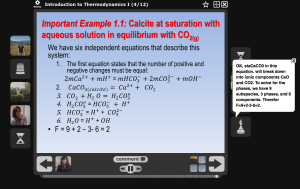Neyda Abreu: Associate Professor of Mathematics and Geology, Penn State DuBois
For the summer 2014 session, Neyda Abreu, associate professor of mathematics and geology at Penn State DuBois, used VoiceThread in her courses to change the format from traditional face-to-face instruction to blended (or hybrid) courses, including EMSC 121 Minerals and Modern Society with 25 students, GEOSC 303 Environmental Geology with 12 students, GEOSC 201 Earth Materials with 12 students, and CHEM 101 Introductory Chemistry with 25 students.
How She Used It
Abreu used VoiceThread to flip classes from being traditional residential face-to-face courses to being offered in a blended or face-to-face format. As a somewhat natural evolution of her previous on-site lectures using PowerPoint, she now places crucial lecture content online in VoiceThread presentations. She carefully considers the most important concepts that students need for fundamental core knowledge for a course, as well as the most complex topics that are known to be complicated topics for students to grasp, and she creates VoiceThread presentations for students to review online in place of the previous traditional class lectures. Abreu has made it a practice to answer these questions within 24 hours.
In this format, students can review the material as many times as necessary and they can essentially interrupt the flow of the presentation and ask questions at precisely the exact point where they need more information through adding questions in the form of a VoiceThread comment.
Example
Guiding Principle for Use: More Effective Instruction for Difficult Concepts
Using VoiceThread to essentially flip traditional lecture-based science courses to convey essential core concepts as well as difficult to comprehend complex concepts and processes allows students to review content multiple times and to ask the instructor questions without interrupting the flow of the presentation of lecture information.
In the past, all course content was presented in traditional lecture style using PowerPoint presentations to punctuate key words and phrases and to use graphics to show complex processes. In the previous form, students were reluctant to interrupt the instructor with questions about the content until the lecture presentation was finished or when the instructor asked whether there were any questions. Students were often reluctant to attempt to phase questions on the spot in front of other classmates for fear that their question may appear as being silly or unintelligent.
With VoiceThread, students are able to view and review content as necessary for their individual instructional needs. They are able to take the time to phrase questions in an intelligent manner, and they are able to insert the question into the presentation where it makes the most impact on their individual learning process without interrupting the flow of the presentation. Ultimately, all students in the course may benefit from the question(s) posted by other students, as we know that often if one student has a question, then several others have the same question but may be too intimidated to ask, or may simply not know enough about topic to phrase the question that needs to be asked. Additionally, content presented through VoiceThread can more easily contain illustrations and videos that assist in conveying complex processes and concepts.
Outcomes
Through the use of VoiceThread to present lecture information as an online resource, students in Abreu’s courses are able to learn more thoroughly and at a level that meets their individual instructional needs.
Future Use and Issues
Abreu plans to expand the use of VoiceThread from use in blended or hybrid courses to using it for teaching online courses. She would like to include more original video content such as screen captures of how to solve equations. Abreu is currently exploring how to use SmartBoard recordings showing content such as concepts of thermodynamics and how best to include that content in VoiceThread presentations or assignments.
About Neyda Abreu
Neyda Abreu arrived to Penn State DuBois in 2007 and is currently an associate professor of mathematics and geology. Abreu is a planetary mineralogist and geochemist who is particularly interested in the processes that took place in the solar nebula and protoplanets and how they shaped evolution of the early solar system. In order to understand these processes, she studies some of the most primitive meteorites, called carbonaceous chondrites, with the aid of optical and electron microscopes. Abreu is very interested in introducing undergraduate students to space, materials, and/or space materials.


